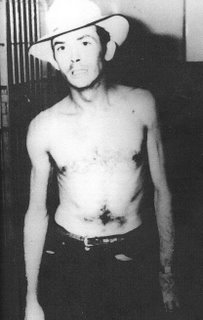
Hank Williams was born in Mount Olive Alabama on 17th September 1923. He died just 29 years later. Had he lived he would have been 83 today. Imagine him sitting politely through yet another birthday special, coming to you live from Nashville’s historic Ryman Auditorium with, say, The Dixie Chicks presenting a ghastly parade of contemporary country luminaries paying insincere tribute to the Grand Old Man of The Grand Ole Opry, (all that earlier sacking business and other unpleasantness conveniently forgotten)? Actually it IS quite easy to imagine, country audiences love bad boys and the country music establishment, with whom Hank had fallen out shortly before his untimely demise, were quick to claim him after his death. But I prefer to believe Hank would have remained too ornery for any cheesy all star tribute.
Your Cheatin’ Heart is my favourite Hank Williams song. In fact Your Cheatin’ Heart is quite possibly my favourite song of all time. I can’t think of a version of it I don’t like. Presley’s 1965 version with The Jordanaires isn’t great.Elvis refused to overdub it, deeming it unfit for release and in truth the King turns in a performance that borders on self parody. A missed opportunity but the song survived it.
Your Cheatin’ Heart was recorded at Hank's last ever recording session on 23rd September 1952. Williams' second wife claimed that he wrote the song about his first wife, Audrey, from whom he had split in January 1952 after a passionate, and sometimes torturous, relationship.
‘Hank started telling me about his problems with his ex-wife, Audrey. He said that one day her cheatin' heart would pay. Then he said, "Hey, that'd make a good song! Get out my tablet, Baby; me and you are gonna write us a song!" Just about as fast as I could write, Hank quoted the words to me in a matter of minutes.’ (Sing Your Heart Out,Country Boy Dorothy Horstman)
In August of 1952, Hank had been fired from The Grand Ole Opry having been deemed unreliable. In October of that year he wed his second wife, Billie Jean Jones, not once but three times (twice before a paying audience at a sold out Municipal Auditorium in New Orleans).Sometime on 31st December 1952/1st January 1953, Hank Williams passed away in the back of his Cadillac. His funeral was held in Montgomery, Alabama on 4th January 1953. The following month MGM issued Kaw Liga with Your Cheatin’ Heart on the flipside. Both sides became number 1 hits.
On 7th January 1953 Joni James recorded Your Cheatin’ Heart for MGM. The next day Frankie Laine recorded the song for Columbia Records. Laine's version was released in the wake of James', which hit number 2 in the Billboard pop charts, but nevertheless it reached a respectable number 18.
This was the version of Your Cheatin' Heart I first heard. I think it was some time in the mid- seventies, on The Best of Frankie Laine (Hallmark Records HM 515) an album my parents had bought on cassette tape to play in the car. Laine’s robust singing style didn’t much appeal to me then but Your Cheatin’ Heart struck an immediate chord, though it confused as much as it delighted me.
Your Cheatin’ Heart is a confusing song. The confusion starts right with the opening three words: “Your cheating heart…” Hank himself seems to weigh each word more or less equally but others have greater difficulty. Frankie Laine requires an enormous whooshing breath before he can bring himself to sing these words, Gene Vincent stutters, singing “Your cheat, cheatin’ heart…” whilst in his 1962 version Nat 'King' Cole, perhaps uncomfortable with the words accusatory tone, opts out altogether leaving the opening lines to a bland chorus of girl singers before finally joining in at line three, “But sleep won't come the whole night through...”.
Once one gets inside this song it becomes apparent what a strange, clever and frankly quite nasty piece of work it is. Initially it seems a fairly standard exercise in self pity but, in fact, Your Cheatin’ Heart is a cuckold’s feverish revenge fantasy. The singer wishes pain and heartache upon their former lover but in so doing only confirms their own misery and loneliness: “You'll walk the floor the way I do…” It is impossible to escape the feeling that the sufferings detailed in the song are actually those of the narrator not their subject. These are future events, wished for rather than actual: “Your cheatin' heart will pine some day”, it says though in the songs present it does not seem as if the faithless ex suffers at all.
Incredibly Hank's career really lasted only five short years but in that time he enriched The Great American Songbook with songs as breathtaking as Cold Cold Heart , I'm So Lonesome I Could Cry and, of course, Your Cheatin' Heart.
Hear Hank's timeless version here .
I'm not Sure Hank Would've Done It This Way but I love this 1969 version by James Brown.
